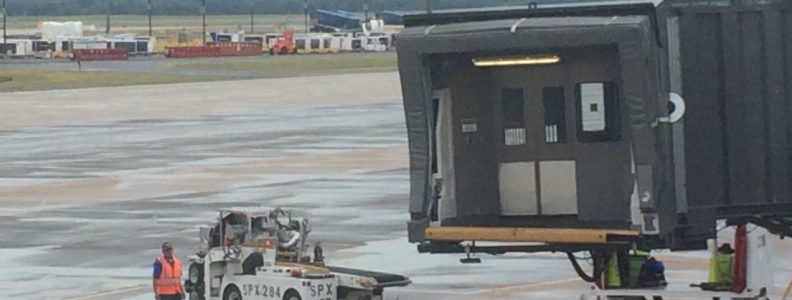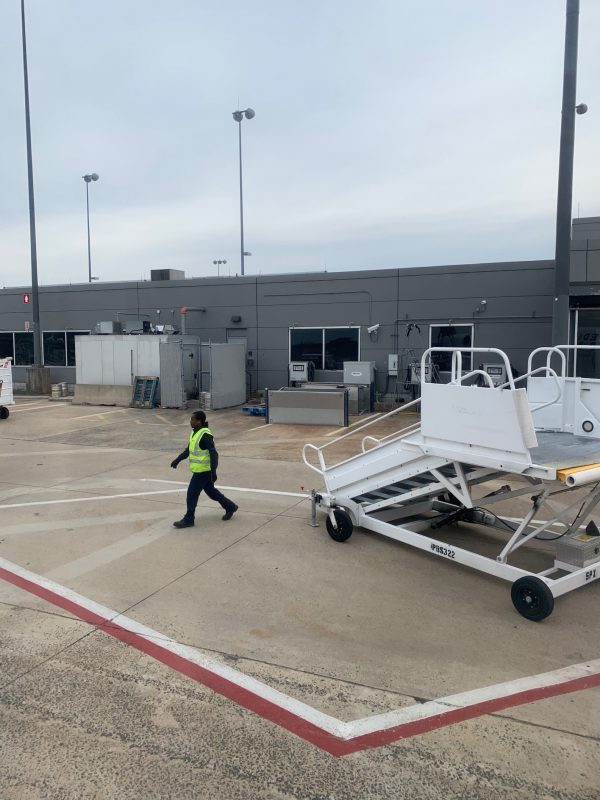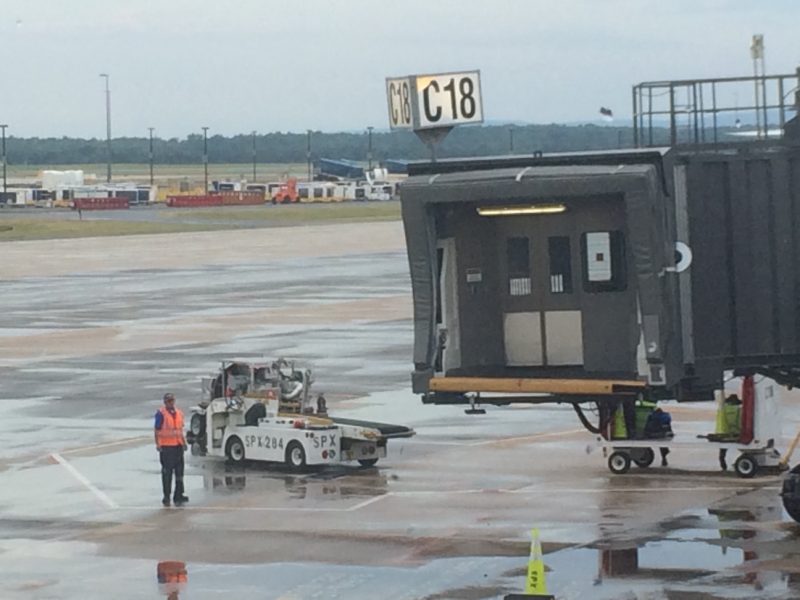
Dulles Airport Worker Lightning Strike Case – “Act of God” Defense

Working out of the “Air Operations Area” (AOA) of a major international airport presents many dangers. It is hard to hear because of the jet noise; it’s hard to see when it’s dark; the jet fuel and de-icers cover other smells and potential dangers; the vibrations on the runway make it difficult to “feel” an oncoming truck or aircraft; and, there’s just a lot going on with vehicles and aircraft coming and going.
At the airport injury law firm Abrams Landau, Ltd., we see all kinds of airport injuries because of these increased dangers due to the unique environment of the tarmac. But even when there is an on the job injury at the airport, it is not necessarily “compensable” under Virginia law. A 2019 case handled by friends of attorney Doug Landau looked at whether injuries should be covered when they happened during a thunderstorm at Washington Dulles International Airport (IAD) down the road from the Abrams Landau law office.
Under the Virginia Court of Appeals ruling in the case, a Dulles airport employee who was injured while servicing an airplane could not receive benefits because he failed to exclude lightning as a possible cause of his injuries, which is an “act of God,” and failed to show he was working at a location or performing a work related duty that created a special or “peculiar risk” of exposure to a lightning strike.
Virginia law requires an “actual risk,” and not a “positional risk” (i.e., being in the wrong place at the right time) in order to prevail.
FACTS:
The claimant sustained injuries while working as a ramp serviceman at Washington Dulles International Airport (IAD). Earlier on the day of the incident, the outdoor ramp where he was working was temporarily closed due to thunderstorms in Loudoun County Virginia. According to the case report:
Later in the claimant’s shift, the ramp where he was working reopened, and a Boeing 787 arrived at one of the gates. As the claimant touched the toggle switch, “a blue arc came out of the control panel.” The arc “flash[ed]” “right in front of his face,” and he “felt electricity” go “through his body.” The claimant told his supervisor and another employee that he had been struck by lightning, and he immediately sought medical treatment.
The trial judge noted that under Virginia law, the mere occurrence of an injury due to a lightning strike while at work is insufficient to invoke the coverage of the Workers’ Compensation Act and that a claimant must prove, additionally, that the conditions of the employment collaborated in causing the injury. He further found that the claimant had not presented
“persuasive evidence . . . that [he] was working at a location or performing a work related duty that created a special or peculiar risk of exposure to a lightning strike.”
Finally, he concluded that the evidence presented the possibility that the injuries could have resulted from a sudden discharge of static electricity from the plane arising out of the employment rather than from a lightning strike but that this theory was mere speculation on the evidence presented. The Virginia Workers Compensation Commission (“VWC”) unanimously affirmed the denial of benefits.
LEGAL ANALYSIS:

In Virginia, under the actual risk test, proof of an injury while at work from lightning or some other “natural force,” standing alone, is considered “an act of God” and does not establish that the employee is entitled to coverage under the Act. However, when “some condition or environment” of the employment poses “a special or peculiar risk” from “the disastrous forces of nature,” the injury is “compensable as a risk of the employment.” The test under the actual risk doctrine, therefore, is “whether [a condition of] the employment collaborated [with the act of God] in causing the injury.”
The claimant argued that the VWC erroneously concluded that the evidence did not sufficiently identify anything about the airplane or the circumstances of the employment that collaborated with the act of God to cause his injuries. His excellent, experienced lawyer Kathleen Walsh pointed to the evidence establishing that, as he put his finger on the plane’s toggle switch, he saw a blue arc come out of the plane’s panel box and felt it course through his body. He asserted that he should not have had to hire an “aeronautics expert” to prove an aircraft malfunction and contends that the evidence he produced was adequate to establish that his injuries arose out of his employment. Additionally, he argued that even if lightning caused his injuries, the requirements of his employment that “he work outside in an exposed area during storms” and “use a metal step ladder” “situate[d] . . . in a pool of one inch [of] water” in fact “create[d] a special and peculiar risk of exposure to lightning.”
At first glance, one might think that the claimant met his burden under the actual risk test. However, application of the case law to the factual findings of the Commission refutes such a conclusion. Although possible causes of electrocution in this case other than lightning, such as a discharge of static electricity from the airplane or an electrical malfunction, would constitute compensable actual risks of the claimant’s employment, the appellant did not exclude lightning as a possible cause of his injuries. Critically, on this record, Virginia’s controlling case law specifically involving lightning strikes compels us to hold that the VWC did not err in refusing to award benefits in the case of O’Donoghue v. United Continental Holdings Inc., decided March 26, 2019.
This case points out how difficult airport injury cases can be, even for the people who work on the runways. If you or someone you care about has been injured at an airport, and there are questions as to how best to proceed, please call us at (703)-796-9555 or contact us via e-mail here on our Landau Injury Law website.
